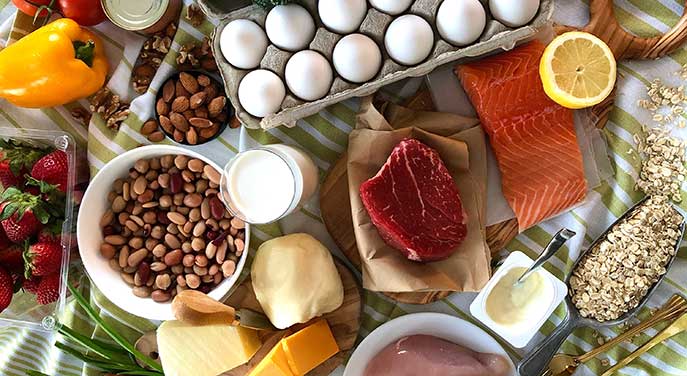If you’re being treated for cancer, don’t leave meat, fish and dairy off your plate, University of Alberta experts advise.
Though avoiding animal-based proteins like red meat may seem healthier, relying on plant-based protein alone isn’t a good plan while fighting cancer, said Carla Prado, a nutrition expert in the Faculty of Agricultural, Life and Environmental Sciences.
 Carla Prado |
 Katherine Ford |
“When you have cancer, the majority of protein in your diet should be animal-based, and it is safe to eat.”
Proteins like red meat or pork tend to get a bad rap when lumped in with their highly processed cousins like cured ham, bacon and salami, which have been linked to causing cancer.
“Unfortunately, there’s this misconception that if one type of meat is bad, then all meat is bad, but this is certainly not the case.”
In a new opinion paper, Prado and her co-authors – cancer nutrition experts from around the world – reviewed available scientific data and suggest that meat, fish, eggs, poultry and dairy offer better muscle-building properties than plant-based proteins, such as legumes.
Animal-based protein is higher in amino acids, which are vital for building and growing new muscle tissue, as well as helping people better tolerate cancer treatments like chemotherapy.
“Our research has already shown that the more muscle you have, the less severe the toxicity of cancer treatment, your quality of life is better and you can live longer,” said Prado, a professor in the Department of Agricultural, Food and Nutritional Science.
Cancer treatments can also erode muscles through poor appetite, bedrest or the stress of surgery, so people undergoing treatments need more protein than healthy individuals, said dietitian Katherine Ford, a PhD candidate in nutrition and metabolism and co-author of the paper.
|
Related Stories |

|
| Five things you should know about eating a high-protein diet
|
| New cookbook boosts protein diet to help people beat cancer
|
| Protein wars ramp up as Canadians slowly move away from meat
|
Many people don’t realize the body’s nutritional needs differ during cancer treatment versus eating to prevent cancer, Ford said.
“The amount of protein a person needs to maintain muscle goes up significantly during treatment.”
The researchers recommend that at least 65 per cent of total protein intake be from animal-based foods during treatment.
“Combined with plant protein, it’s likely the best way to support muscles and avoid malnutrition,” said Ford.
People being treated for cancer would have to eat significantly more plant-based proteins to get the same benefits of also including meat, fish, dairy or eggs on their plates, she noted.
Current recommendations suggest people should consume 1.2 to 1.5 grams of protein for every kilogram of body weight daily during cancer treatment. Ford suggested that the easiest way to increase intake is to include a protein source in every meal and snack.
Adding tuna or leftover chicken to a salad or casserole, pairing some cubed cheese with fruit or whole-grain crackers, or adding yogurt to a snack or as a dessert are all easy ways to include animal-based protein sources.
“By doing that, you’re well on your way to meeting your nutrition needs.”
The researchers also recommend that those sticking to an entirely or mostly plant-based diet during cancer treatment need to see a dietitian to ensure they are getting enough protein.
“It’s important for making sure they’re getting adequate nutrition to properly support muscle health,” Prado said.
The research was funded through a grant awarded to Prado through the Campus Alberta Innovation Program in Nutrition, Food and Health.
Prado is also a member of the Cancer Research Institute of Northern Alberta and the Women and Children’s Health Research Institute.
| By Bev Betkowski
Bev is a reporter with the University of Alberta’s Folio online magazine. The University of Alberta is a Troy Media Editorial Content Provider Partner.
The opinions expressed by our columnists and contributors are theirs alone and do not inherently or expressly reflect the views of our publication.
© Troy Media
Troy Media is an editorial content provider to media outlets and its own hosted community news outlets across Canada.


